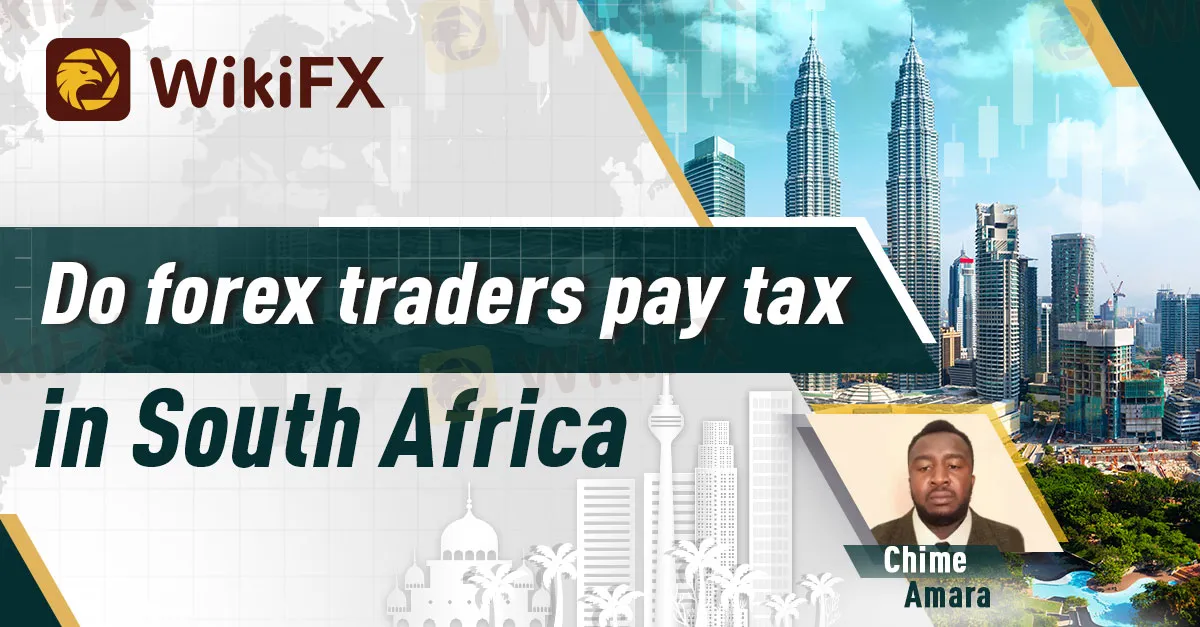简体中文
繁體中文
English
Pусский
日本語
ภาษาไทย
Tiếng Việt
Bahasa Indonesia
Español
हिन्दी
Filippiiniläinen
Français
Deutsch
Português
Türkçe
한국어
العربية
Do forex traders pay tax in South Africa
Abstract: Forex trading is a legal business across the globe. It is very legal to trade forex today in South Africa without any hindrance. However, all forex traders in South Africa are expected to pay tax on all their capital gains from forex trading. To avoid monthly payment of taxes on all income from forex trading, South African traders are expected to register themselves as provisional tax payers which enables them to pay taxes after every six months.

Do forex traders pay tax in South African
Generally, all forex traders in South Africa are expected to pay tax on all their capital gains in forex. Even when the profits have been realized using an offshore account. As long as the trader resides in South Africa at the moment the profits were made, he will be expected to declare them as capital gains and pay tax on them.
The total tax to pay from income realized from forex trading in South Africa is calculated after all expenses made on trading have been deducted especially if one has an account manager. The fees paid to the account managers are to be subtracted from the gross income. The remaining balance is considered as the net profit and the trader is expected to pay tax on them.
To make it easy for calculating the profits made from forex trading, all local forex traders are expected to keep a good record of all transactions related to their forex trading activities. Also, it is advisable to convert the remaining profits after all expenses have been subtracted to the local currency known as the South African rand.
More so, for one trading using a business name such as a private company, large corporation, or small business corporation; the tax payment for this category is usually classified as corporate income tax (CIT).
Finally, failure to declare one's profits from forex trading attracts some penalties.
What is the recommended method for tax payment for all South African traders?
Forex trading is often a long-term investment. This means the profits are not usually calculated monthly. Therefore income from forex trading may not be subject to PAYE which means Pay As You Earn. PAYE is a system of monthly tax payments to SARS.
To navigate this monthly PAYE for all profits realized from forex trading, the South African trader needs to register as a provisional taxpayer with SARS.
All provisional taxpayers in South Africa are required to make two provisional tax payments each year. The first tax payment is to come within February while the second payment is expected to be made before the end of August of every year.
Provisional tax payment helps all South African forex traders to spread their tax obligations over the tax year and avoid frequent monthly tax payments. Also, all corporate businesses are required to register as provisional taxpayers.

Disclaimer:
The views in this article only represent the author's personal views, and do not constitute investment advice on this platform. This platform does not guarantee the accuracy, completeness and timeliness of the information in the article, and will not be liable for any loss caused by the use of or reliance on the information in the article.
Read more

"Rate & Reward: Broker Review Contest"
Share Your Real Experience, Rate Your Broker Duration: April 21, 2025 – May 23, 2025 Eligibility: Must be a verified account holder of the reviewed broker.

Why Are More Regulated Brokers Providing Free VPS Services?
Discover why more regulated brokers are offering free VPS services, enhancing trading efficiency, reducing costs, and improving client retention in the competitive trading market.

Southeast Asia’s Booming Investment Scams | How Smart Traders Stay Safe
The stories are all too familiar: “A slick website, aggressive marketing on social media, promises of guaranteed returns, and then radio silence when it’s time to withdraw.”

What Every Trader Must Know About Online Brokers
In the world of online trading, where fortunes can be made or lost in the blink of an eye, success often depends on more than market knowledge or strategy. It hinges, sometimes invisibly, on one crucial factor: your online trading broker. But what exactly is an online trading broker, and why is their role so pivotal to your financial journey?
WikiFX Broker
Latest News
Think Scams Won’t Happen to You? That’s Exactly What Scammers Count On
Currency Calculator


